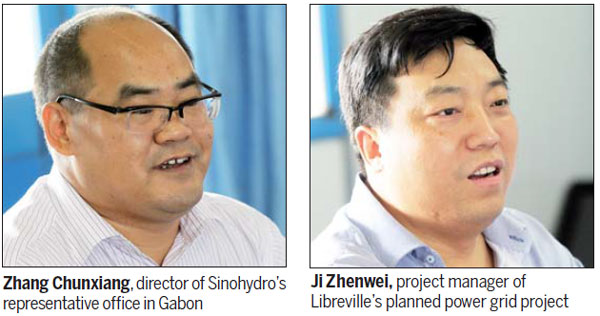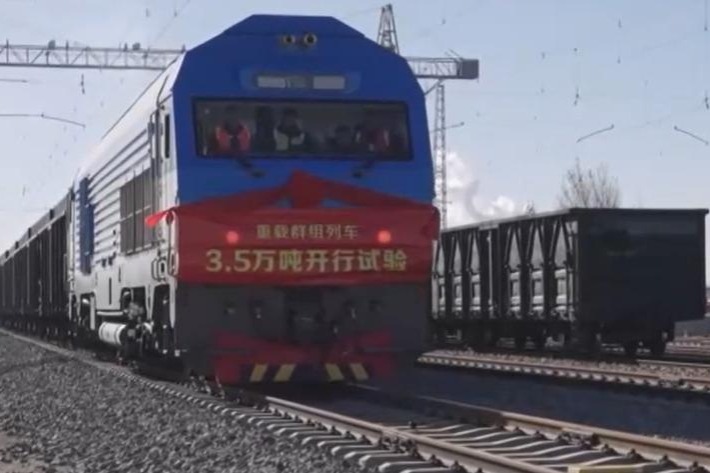Sinohydro has powerful connections

| The Grand Poubara, a hydroelectric station with a capacity of 160 megawatts, is expected to alleviate the power shortage in Gabon. Provided to China Daily |
| A new transformer substation in Angongje, an expanding industrial zone, built by Sinohydro in Libreville, will provide power for companies in the zone. Zhang Wei / China Daily |

Chinese energy giant outlines its plans to help bring reliable supply to Gabon's capital city and beyond
When Mariam Diallo was a child, she often remembers, many of her friends' homes were blacked out during the evening.
The office worker, who is now 46 and lives in Gabon's capital city Libreville, recalls many nights when the lights went out or did not even turn on in the first place.
"Power supply in Libreville was patchy at best back then," she adds, "and very unstable".
But happily for her and her neighbors, the situation has improved greatly in recent years.
"Today there are far fewer power outages and more and more families have permanent electricity," she says, and she attributes a significant part of that progress to Sinohydro, the Chinese state-owned company she now works for.
Since it first entered Gabon more than a decade ago, Sinohydro has been actively involved in many vital infrastructure projects.

The company now has three engineering bureaus in the country that are involved on a series of projects ranging from road construction to power grid upgrades.
One of the bureaus is handling a renovation of Libreville's main power grid, which is expected to improve the reliability of the city's once-fickle energy supply.
Sinohydro recently completed the building of the Grand Poubara, a hydropower station that is now feeding an additional 160 megawatts of generating capacity into the west central African country's electricity grid.
Ji Zhenwei, project manager of Libreville's planned new power grid project, says the existing system is decades old and too fragmented.
"The grid is scattered and many of the sites are isolated from each other," he says.
"We are connecting them to form a loop, and strengthening them, too, to enhance its capability in case of emergency."
In Angongje, an expanding industrial zone in Libreville, a new transformer substation has just been completed to provide its high-voltage industrial users with greater capacity.
All the power equipment used is from China, and has so far stood up to the rigorous testing being carried out.
"Our Chinese equipment is proving very well suited to the African market," Ji says.
Sinohydro's long-term goal is to link Gabon's power grid nationwide, though this is being done gradually, and the company has had to bid competitively for contracts.
Covering a total area of more than 267,000 square kilometers, Gabon has a population of about 1.5 million, the majority of whom are divided among three major cities: Libreville, Port Gentil and Franceville.
Ji says the company has taken great care to make sure all its work is carried out with the interests of the local workforce foremost in mind.
"We came here not only looking for profit, but aiming to bring social benefits to the people of Gabon," Ji says.
Hundreds of local workers are employed at the start of every project, meaning a huge boost each time to local employment levels.

All those taken on are immediately given training in the skills needed to complete a typical Sinohydro project, he adds.
"Once the country's whole electricity grid is connected, we also plan to build a national center for the continued development of the power grid in Gabon, just like we have for our system in China," Ji says.
A training center for local people to become qualified electricians is also in the pipeline.
By promoting Sinohydro's energy brand and its equipment, Ji says he is aiming to raise the standard of the energy industry operational efficiency in a country that "still has huge potential in hydropower with only a very small percentage of that developed so far".
A port city at the mouth of the Komo River, near the Gulf of Guinea, Libreville has strong wind power potential, too, with an average wind speed just offshore of 10 meters per second, he adds.
Throughout its construction activities in Gabon, Sinohydro has stuck to strict environmental standards required by the government.
During the building of the Grand Poubara hydropower station, for instance, a lower dam was created to reduce the impact of the water being gathered behind it.
"This required the use of much larger generators to meet the energy demand needed," he says.
Zhang Chunxiang, the director of Sinohydro's operations in Gabon, says the biggest challenge it faces, however, is a shortage of qualified staff.
On the one hand, there is the shortage of Chinese staff to work for the company there, while more importantly, there is a scarcity of skilled workers in Gabon itself.
The country has strict rules limiting the number of foreign workers.
For each Chinese worker, four Gabonese have to be employed, a ratio that is hard to meet, Zhang says.
It is challenging for the company to get enough work visas approved for the number of experienced technicians needed from China.
"Without visas, these highly qualified workers cannot come, and as a result projects have to be delayed," he says.
Ji adds that training local workers has become increasingly important and the continued localization program will be crucial to Sinohydro's ongoing progress in Gabon.
Contact the writers through lifangchao@chinadaily.com.cn
(China Daily Africa Weekly 06/20/2014 page19)
Today's Top News
- Analysts: China not necessarily relying on Nvidia for chips, ecosystem
- Beijing, Berlin eye productive relationship
- Para-games show commitment to inclusion
- HK election hailed as a milestone for democracy
- Mind the financing gap in infrastructure
- Is embodied AI hype or hope?
































